Jean Tirole
Biographical
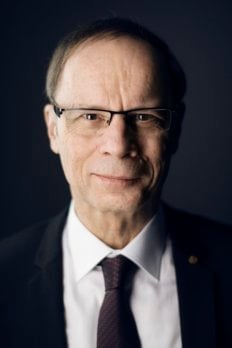 My Educational Background
My Educational Background
I was born and raised in Troyes, a town located east of Paris and north of Burgundy. Troyes was the capital of Champagne in the middle ages; its fairs hosted trade between Northern Italian cities and Flanders among others; Troyes has accordingly preserved a rich cultural heritage. My father, who passed away in 1992, was an obstetrician/gynecologist; my mother, who still lives in Troyes, taught French, Latin and Greek in high school. My parents as well of some of my teachers taught me the value of knowledge. I have two sisters, Marie-Claude and Laurence. My youth was a pretty uneventful and happy one.
I left Troyes after my baccalaureate to carry out preparatory studies at the Lycée Henri Poincaré in Nancy (1971–1973). I then entered the Ecole Polytechnique (1973–1976), followed by the Ecole des Ponts et Chaussées (1976–1978), a “doctorat de troisieme cycle” (a degree intermediate between a Master degree and a PhD, which has since disappeared) in decision mathematics from Université Paris-Dauphine (1976–1978), and finally a PhD in economics from MIT (1978–1981).
In high school, I was particularly interested in mathematics and social sciences (history and psychology in particular). I kept a strong interest in sciences at the Ecole Polytechnique, especially in mathematics with professors such as Laurent Schwartz, a Field medalist for his theory of distributions. Economics was not an obvious choice of study given my family background and the rather weak economic culture in France. As a matter of fact, I was rather unknowledgeable about the topic. I attended my first course in economics at Ecole Polytechnique at the age of 21. I was fascinated by the issues and liked how it combines rigorous analysis and social sciences. I started thinking about becoming an economist.
In 1976 I joined the engineering “corps of roads and bridges” (Corps des Ponts et Chaussées), an applied corps of civil servants dating back to 1716 and that most members enter after the Ecole Polytechnique, and accordingly studied at the Ecole des Ponts et Chaussées, a school created in 1747. The corps has been very generous with me, supporting me while I studied for a PhD in the US and thereafter in my career in France. I am still a member of the corps, and I’m obviously grateful for its letting me accomplish my passion for research.
This choice of the Corps des Ponts may seem an odd choice for someone about to become an economist; yet, the corps has a long tradition of excellence in economics since Jules Dupuit, who in 1844 discovered – as he was studying public infrastructures and railroads – the notion of consumer surplus (the difference between the price consumers as a whole are willing to pay – the “willingness to pay,” a measure of which can be derived from the demand curve – and the actual price they do pay) and the principles underlying market segmentation (through non-linear pricing and by offering a range of different qualities). This tradition of excellence was continued by François Divisia and René Roy, and many others since. Co-authors of mine who originate from that corps include Roger Guesnerie (whom I met during classes he gave at the Ecole Polytechnique, at the Ecole des Ponts and who was my adviser in Paris; he just retired from the economics chair at the Collège de France), Roland Bénabou (Princeton) and Bernard Caillaud (Paris Sciences Economiques). Corps des Ponts members have included five Presidents of the Econometric Society, the most prestigious international society for economics. The 70 former Presidents of this society (founded in 1930) include Irving Fisher, Schumpeter, Keynes, Arrow, Samuelson, and many Nobel Prize winners. Corps des Ponts “engineer-economists” outside the academic sphere have also always been very active in the public debate.
Why Economics?
Research in economics offers a twofold opportunity: addressing demanding, intellectually absorbing theoretical problems and contributing to decision-making in the public and private sectors. On the latter point, economics is a positive discipline (in so far as it seeks to document and analyze individual and collective behavior), but it is also, and ultimately, normative: Its goal is to “make the world a better place” by recommending economic policy measures. This strong normative content is, in my opinion, an important factor behind its appeal.
My engineering degrees (which in the French tradition were fairly mathematics-oriented) may not have been the most direct route to economics, but they were not as distant as might be thought.
My research deals both with methodological aspects and with applications to different areas of economic life. Applied economic theory offers some analogies with engineering sciences. The starting point is a concrete problem, either already identified or gleaned from observing reality or listening to decision-makers, public or private. Then follows a detour through abstraction. The essence of the problem is extracted in order to focus on its key aspects. In this simplification process lies much of the difficulty of the exercise; for tractability, the researcher cannot take everything into consideration. (S)he must select what is important and sort out what is anecdotal (i.e., its omission has little chance of changing the analysis). The experience of the researcher and discussions with practitioners are very useful at this stage, although ultimately a study of the robustness to underlying assumptions is highly desirable. Then, the model can be tested: econometrically if past data are available, and in the lab or in the field as well. One cannot underestimate the interaction between theory and empirics: empirical work needs theory, both to guide it and to make it useful for policy. Theory needs empirical work to strengthen the confidence in policy recommendations and also to suggest key omitted ingredients.
The PhD Years
In 1978, I traveled across the Atlantic to undertake a PhD in Economics at the Massachusetts Institute of Technology (MIT), graduating in 1981. MIT had a relatively low profile in the field of economics until the arrival of Paul Samuelson in 1940, but in the 1960s it became the best economics department in the world. The intellectual vibrancy, the professors’ dedication to teaching, and passion for an economic discipline which is both rigorous and application-orientated are all part of the culture of MIT. Ever since then, I have been deeply convinced that the field can advance only through mutual respect across fields and across research styles.
An anecdote here: being a civil servant, I was given two years to obtain my PhD and return to France. This was of course highly unrealistic. I rushed to pass waivers in the first-year core courses and (like my classmate Drew Fudenberg) to pass my generals at the end of the first year. Having been raised in an examintensive environment, I succeeded in doing so at the detriment of understanding economics. Indeed, after a core macroeconomics waiver, Rudi Dornbusch wondered how I succeeded in passing, understanding so little to the field; he wisely advised me to attend the course nonetheless (without taking the final exam), which I did. During this year of PhD coursework, my four fields of specialization were theory, public finance, econometrics and international economics. I then started a thesis under the supervision of Eric Maskin, a 29 year-old MIT professor. At the end of my second year at MIT, I received a letter saying that I was allowed to stay in the US for a third year. This pressure-free third year turned out to be a fantastic opportunity, as I could devote the time to deepening my understanding of economics, take courses in fields I was completely unknowledgeable about, and start on new research projects.
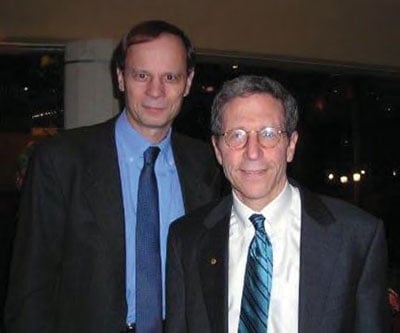
At that time, Eric Maskin initiated MIT PhD students to game theory and information theory. Outside of regular class time, he very generously spent many hours every week in tutorials with fellow Maskin-advisee Drew Fudenberg and me. You can imagine how overjoyed Drew and I, like all former Maskin students, were when Eric deservedly received the Nobel Prize in 2007.
As I explain in the Nobel lecture, I was also very lucky to discover at MIT, thanks to Drew Fudenberg, industrial organization and regulation, fields I was not aware of prior to starting my PhD. I never took these fields for credit, but I sat in classes given by Paul Joskow and Dick Schmalensee and started writing papers with Drew on game theory and industrial economics (later, we also wrote a PhD-level textbook for doctoral students called “Game Theory”).
My thesis, as is often the case now, covered a range of topics: investigating the possibility of bubbles in financial assets (a bubble exists when the value of a financial asset exceeds the “fundamental” of the asset, in other words the discounted value of dividends, interest and rents it will yield today and in the future). Drew Fudenberg and I conducted a first analysis of sequential bargaining under asymmetric information and the resulting inefficiencies (“sequential bargaining” describes a situation where two or more parties bid until one accepts the offer of the other. The study analyzed the dynamics of concessions and the length of the bargaining process before an agreement is reached, when the parties do not have the same information). Finally, the thesis covered research (also in collaboration with Drew Fudenberg) on pre-emptive strategies through the accumulation of productive capacity in oligopolistic markets. None of these subjects were directly within the scope of Eric Maskin’s research topics but, like all great teachers, he never pushed his students to follow and refine his work, but rather encouraged and supported their own initiatives.
While Eric Maskin was instrumental in my development as an economist, I interacted with a number of professors other than my thesis advisor, as well as several talented fellow PhD students. Equally important was the opportunity to take a number of specialization courses (macroeconomics, public economics, international economics, etc.) in fields not directly related to my thesis. In economics, research fields change quickly and multidisciplinary knowledge is often essential to bring fresh thinking.
From 1980 to 1983, I also often spent time at Stanford, especially during the summer. While MIT and Harvard were the best departments for general economics, Stanford University and Northwestern University, whose researchers also often visited Stanford, were at the cutting edge of the revolution of game theory and information economics, ahead of their rivals on the east coast (with of course a few exceptions, such as Eric Maskin).
The Post-PhD Years: Research & Teaching, And an Important Encounter
After my PhD in 1981, I did not go on the job market and went back to France to work as a researcher at the Ecole Nationale des Ponts et Chaussées (ENPC). At the time, a small economics research centre, CERAS, was being established with, notably, Serge Kolm as Director, Roger Guesnerie working there part time and Bernard Caillaud (with whom I have since often collaborated) as student.
In 1982 I began my work on the regulation of network industries and public procurement with Jean-Jacques Laffont, whom I had met in Rio in 1980 during an Econometric Society conference. Jean-Jacques Laffont, who had resisted the call of major American universities and was starting to establish a school of economics in Toulouse, regularly came to the ENPC to work on this subject. A student of Ken Arrow at Harvard (like Eric Maskin, with whom he had already done very innovative work), he had already contributed fundamental papers on information theory and public choice theory.
We thus began to talk about structural reform in sectors such as telecoms, electricity, postal services and the railways. The performance of incumbent operators in most countries across the globe was unsatisfactory, and economists and decision-makers were reflecting on potential reforms which could make companies more accountable for their costs, and on reforms that would facilitate competition in non-bottleneck segments. Jean-Jacques Laffont and I felt that the new theories of information and industrial economics could add an important perspective on this type of reforms and their limits.
In the fall of 1982, I received an offer to teach as an associate professor at MIT, which I accepted. Having just met my future wife Nathalie (we got married in 1984), who had to finish her master degree in law at the University of Paris in 1983–1984, I started to teach at MIT in September 1984.
1984–1991: Back to MIT, the Consolidation Years
The MIT years were seven years of research and teaching in a perfect environment: a reasonable teaching workload focused mainly on doctoral courses, no administrative work, and above all an exceptional intellectual environment. The economics department had a very collective and congenial atmosphere. The tone was set by professors such as Paul Samuelson, Bob Solow, Franco Modigliani, all Nobel Prize winners, who showed humility, refused to set themselves above others and emphasized the ability of the younger faculty to identify promising areas for recruitment.
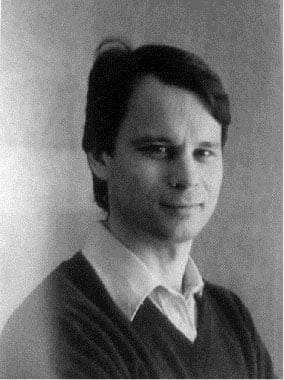
Beyond the obvious intellectual attraction, I learned at MIT about mechanisms for good governance in a department and university, which later helped me think about potential reforms in the French university system.
MIT has always treated me very nicely. When in 1992 I decided to stay in Toulouse, I was invited to be a visiting professor for six weeks per year (four of them during July, when I teach a minicourse for PhD students). This year will be the 24th year of this yearly arrangement, from which I have benefited a lot. I always return there with much pleasure, even though older mentors such as Paul Samuelson and Bob Solow and many of my collaborators or people I discussed most with during my faculty years there have moved to other academic or non-academic institutions, retired or passed away: Olivier Blanchard, Peter Diamond, Rudi Dornbusch, Stan Fischer, Drew Fudenberg, Oliver Hart, Jerry Hausman, Paul Joskow, Eric Maskin, Dick Schmalensee, to mention only a few senior faculty, and many others as well. The key point is that a top department is more than its members; it is a culture. When I return, I am struck by the observation that the spirit, the creativity of research and the devotion to students has remained intact despite a substantial turnover.
1991: A Pivotal Sabbatical Year, the Jean-Jacques Laffont Effect
In 1991 I took out a sabbatical year in Toulouse to finish a book, “A Theory of Incentives in Regulation and Procurement,” with Jean-Jacques Laffont. In the 1980s we had discussed his plans to make the University of Toulouse 1 Capitole one of the best European universities in the field of economics, in particular thanks to the creation of an Institute for Industrial Economics (IDEI) which would be financed largely by partners from the public and private sector. The IDEI was established in 1990. Jean-Jacques Laffont and the group of friends who helped him in this initial phase had already managed to bring in a handful of leading researchers to Toulouse and wanted to use IDEI to provide a few more resources to develop a top-level European department. Jean-Jacques Laffont was the director of IDEI until 2002 (Jacques Cremer, Patrick Rey and Hervé Ossard have directed it since) and I have been IDEI’s scientific director since its creation.
In 1992, my wife Nathalie and I decided to stay in Toulouse. Our daughter Naïs was born in Boston in 1989; our two other children, Margot (1992) and Romain (1996), would be Toulousains. I returned to the Corps des Ponts, working at the University, and later developed a secondary affiliation with the Ecole des Hautes Etudes en Sciences Sociales (1995) and became a member of the Académie des Sciences Morales et Politiques (2011).
My motivation for moving to Toulouse was not to work with Jean-Jacques Laffont, since we were already working closely together despite being separated by the Atlantic Ocean. Rather, I was attracted by the collective ambition and the desire to improve the university environment in France (on a small scale of course). I had total trust in Jean-Jacques Laffont, who apart from his wellknown intellectual capacity (he would have been a serious candidate for the Nobel Prize), had remarkable human qualities as well as being a highly competent manager, which is quite unusual in the research world.
The project has been successful and many talented researchers have since joined the group. In the mid-1990s an economics doctoral program was created (entirely in English to attract the best students, both French and foreign – who learn French during their thesis) with a second year of doctorate courses added (a year of courses after the former advanced studies diploma, the DEA, now called M2); this second year, which exists in leading US PhD programs, was uncommon in Europe; and because it has no legal existence in France, we have been financing it on our own funds. It provides students with greater autonomy to write their thesis and a stronger foundation for research.
After my return to Europe, and even though my academic activities always take precedence, I also got more involved in policy-making over the years, through various economic committees such as the French Council of Economic Advisors (Conseil d’Analyse Economique), a non-partisan body that issues reports and opinions related to current policy issues, of which I have been a member since 1999, or other committees dealing with higher education and research. In the academic world, I have been long associated with the Econometric Society and the European Economic Association, which I presided over in 1998 and 2001, respectively.
Meeting the Institution-Building Challenge
In 2004 Jean-Jacques Laffont died of cancer in Toulouse. A terribly sad time. At his funeral, Eric Maskin spoke about his friend Jean-Jacques through a short description of a scrabble game played at the Laffont family’s summer house in Lacanau in the early 80s. Within two minutes, the scrabble game described many of Jean-Jacques’ expressions that were familiar to all his friends; it ended in Jean-Jacques’ winning with the word “magnifique.”
Chances were that the group would disband after such a blow, as Jean-Jacques Laffont had played such an important role in the ex-nihilo construction of the Toulouse economics department and Toulouse had no strong tradition in economics before him. The best tribute to him is that the group did not break apart and actually worked entrepreneurially to further his organizational project.
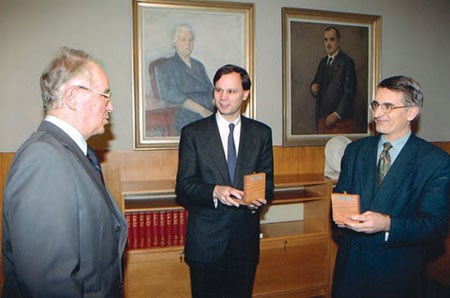
Beyond the obvious intellectual attraction, I learned at MIT about mechanisms for good governance in a department and university, which later helped me think about potential reforms in the French university system.
In 2006, we won a national competition to create 13 centers of excellence across all fields in France. This provided some financial resources and most importantly enabled us to create a private foundation, the Fondation Jean-Jacques Laffont/Toulouse School of Economics (TSE), which I directed until 2009 (at which stage vice-director Christian Gollier took over) and have been chairing its board since. This foundation has received, in roughly equal shares, public and private money. It enjoys the flexibility of private management, while being overseen by the French General Accounting Office (Cour des Comptes). Its board is almost entirely external (13 directors out of 15) and its scientific council fully external: two substantial departures from internally governed French higher education institutions. With the help of the university (Toulouse 1 Capitole) in which we are located, we were thereby able to introduce a number of other policies that may seem trite viewed from abroad, but have been innovative in the French landscape: for instance, creation of tenure tracks for junior faculty (who since the mid-1990s have never been recruited internally); new recruiting processes; creation of a “grande école” within the university system … Like other research-intensive departments in Europe, we also very much benefited from the creation of the European Research Council (ERC) in 2007. The ERC’s goal is to help Europe compete for international talent in an environment in which academic careers often lack attractiveness. It now plays a major role in keeping talented researchers in (or bringing them back to) Europe.
I have long been interested in other social sciences and done research at the border of, in particular, political science (independent agencies, party organization and electoral strategies), sociology (stereotypes and collective reputations, real and formal authority, cliques and collusion, modes of communication, leadership and influence) and psychology (longstanding research agenda with Roland Bénabou related to the psychological aspects of incentives on the one hand, and to motivated beliefs and identity on the other hand). I was therefore very happy when, in 2011, our project to create an “Institute of Advanced Study in Toulouse (IAST)” was selected by an international jury and funded within the program “Investissements d’Avenir,” At the date of its writing, this institute, directed by Paul Seabright, is still a start-up, but has got off to a very promising start. It successfully brings together political scientists, lawyers, psychologists, sociologists, anthropologists, biologists, economists and historians in a fruitful cross-disciplinary exchange.
The history of the Toulouse economics group is that of a team. I must say that this collective institution-building work has been very rewarding and I am grateful to my colleagues – too many to cite here – for what they have contributed.
With Gratefulness
This Prize is so much the outcome of a collective effort that it is impossible to acknowledge all those who contributed to it in their own ways: my wife and family for their unfaltering support; my teachers, colleagues and students for making me a better economist (they still are); the staff at TSE and MIT for their cheerful and very professional help (for instance my assistants Pierrette Vaissade, Emily Gallagher and Marie-Pierre Boe); and all those who have, often anonymously, helped us build our department in Toulouse.
A researcher’s main motivation is the pleasure of discovery, as described by the French mathematician Henri Poincaré: “Thought is only a flash in the middle of a long night. But this flash means everything.” But like everyone else, the researcher is not indifferent to peer recognition. I have received many more honors than I deserve, but I am definitely grateful for all of them. Some were particularly emotional as well as highly honorific: my first honorary degree in 1989 (8 years after my PhD) at the Université Libre de Bruxelles, a very risky choice but an incredible show of trust from ULB, and the one honor that my father was able to witness; the ceremony for CNRS gold medal in 2007 (the second awarded to an economist after Allais in 1978), to which numerous friends came and at which Eric Maskin, on his way back from receiving the Nobel Prize in Stockholm, delivered a hilarious speech explaining to the crowd in the Sorbonne’s Grand Amphitheatre that I actually was an impostor; and many other very memorable moments as well …
But there is of course nothing quite comparable to the Nobel experience. After the phone call from Stockholm and my calling Nathalie and my mother, students and faculty flocked to the building and gave me an incredible reception. Zillions of friends as well as strangers sent warm congratulations, many of them very touching; to the point that, under the general overload, the server broke down and a number of messages were lost.
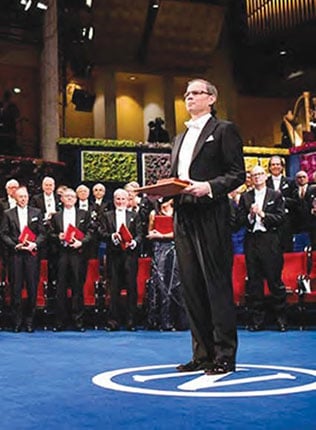
There is something magic about such moments, as everyone, from the closely related to the more distant, rightfully shares the excitement. The following two months were a series of kind gestures of friendship, culminating with a concert given in my honor by Tugan Sokhiev and the Capitole National Orchestra in the evening of December 4, the day before my leaving for Stockholm. The Nobel week was, needless to say, very special. Sharing these moments with my family and friends was wonderful. Colleagues who had contributed to my receiving the Prize came to Stockholm, even though some of them could not even attend the ceremony and banquet due to the limited number of slots. Many others could not come, but shared the moment nonetheless.
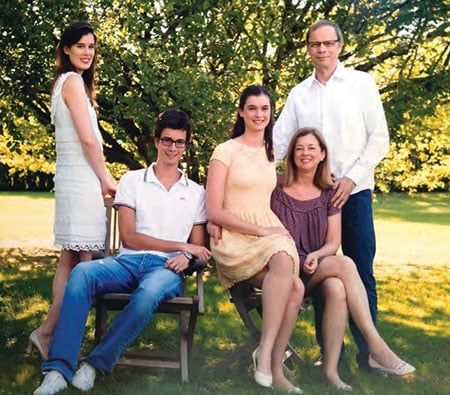
In Conclusion
Research is largely a question of motivation and passion. The intellectual environment is absolutely vital, not only for learning and updating knowledge, but also for motivation. During my career I have been extremely fortunate to “find myself at the right place at the right time” and also to benefit from working with exceptional colleagues and students of the highest caliber, from whom I have learned very much and who often became dear friends. I may just have been very lucky, but I never regretted my early choice of a career as a researcher. As I said in my Banquet speech, wisdom now forces me to return as soon as possible to my previous activities, to the colleagues to whom I am indebted for the Prize, in short to the wonderful life of a researcher.
This autobiography/biography was written at the time of the award and later published in the book series Les Prix Nobel/ Nobel Lectures/The Nobel Prizes. The information is sometimes updated with an addendum submitted by the Laureate.
